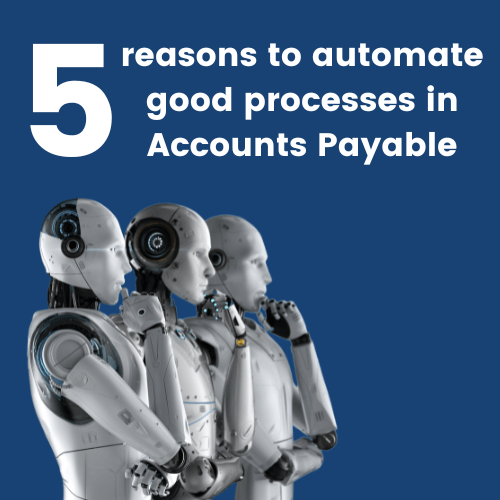Over the past couple of months, the Listening Team at Documation have spent a lot of time talking to CFOs, FDs and Finance Managers, hearing about the challenges they are facing, the wins they have made, and the projects that have not been so successful.
One of the main topics of the conversation has been making sure that only good processes are automated. In today’s business environment finding ways to improve efficiency and reduce costs is increasingly important. As businesses grow and diversify to meet market demands, the AP team’s workload increases. There is often push back from budget holders on investment in more team resources so finding a way to ‘Do more with Less’ becomes increasingly important.
Automating financial processes is an important part of this, providing cost and resource saving. But automating the current process is not necessarily the answer. Reviewing the end-to-end invoice journey in Accounts Payable can generate ideas for changes and modifications to ensure that only ‘good processes’ are automated. Reimagining the current processes that are often workarounds due to legacy software solutions, or even just the ‘way it’s always been done’ scenarios are key to a successful automation project.
Top 5 reasons for automating good processes in Accounts Payable
1. Enhancing Accuracy and Reducing Errors
Implementing automation in Accounts Payable processes goes a long way in minimising errors and boosting precision. Implementing automation, reduces the risk of human errors such as typos or data duplication. Automated validation of invoice information against predefined rules can identify discrepancies or inconsistencies, ensuring that only accurate data is processed.
2. Accelerating Processing Time
Automating good processes in Accounts Payable expedites the overall processing time of invoices and payments. With automation, invoices can be scanned, digitised, and automatically matched to corresponding purchase orders or contracts. This streamlined approach reduces processing time, allowing AP teams to focus on more value-added activities, such as resolving exceptions. Faster processing time also means faster payments to suppliers potentially leveraging discounts for early payment.
3. Strengthening Compliance and Mitigating Risks
Through the automation of well-established processes in Accounts Payable, organisations can maintain consistent compliance and reduce the risks associated with non-compliance. Automated systems can enforce approval workflows, flag suspicious invoices or payments, and provide an audit trail of all transactions. This transparency and adherence to compliance standards not only safeguard the company’s financial integrity but also protect against fraud, errors, and potential legal consequences.
4. Unlocking Data Insights
The automation of effective Accounts Payable processes generates valuable data, which can be leveraged for strategic decision-making. By analysing this data, organisations can identify cost-saving opportunities, negotiate better terms with suppliers, and optimise their cash flow management. Data insights obtained through AP automation enable finance teams to gain a deeper understanding of their financial operations, enabling them to make informed decisions and drive continuous process improvements.
5. Employee Empowerment and Professional Growth
By automating best practices in Accounts Payable, employees can allocate their time to more valuable tasks that necessitate critical thinking and analysis. Mundane and repetitive tasks can be automated, freeing up time for AP professionals to engage in activities that contribute to their professional growth. Automation allows them to develop new skills, enhance their financial expertise, and engage in strategic initiatives. This not only boosts employee morale but also positions the AP department as a strategic partner within the organisation.
Conclusion
In conclusion, automating good processes in Accounts Payable offers numerous advantages. It enhances accuracy, accelerates processing time, strengthens compliance, unlocks valuable data insights, and empowers employees. A well-planned and executed AP automation strategy can transform the AP function from a cost centre into a value-added service, contributing to the overall success of the organisation. The Listening Team at Documation are experts in reviewing AP processes across all industries and draw on their wealth of experience to advise on changing and improving the way invoices are processed. Often processes evolve from software processing requirement or an internal force, having the ability to take an objective view of the full invoice journey gives our team the scope to advise and help prepare organisations for automation. If you’d like to speak to one of our team and book in a process review, get in touch with the [email protected].





